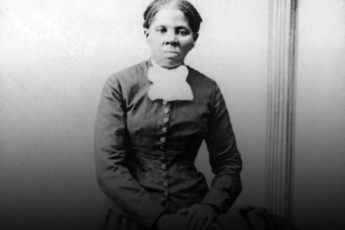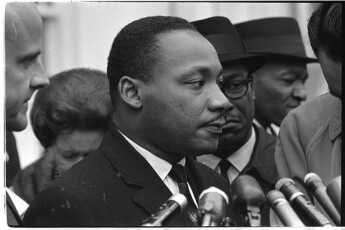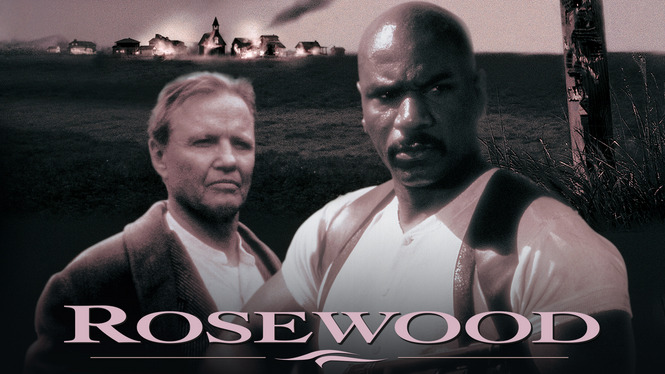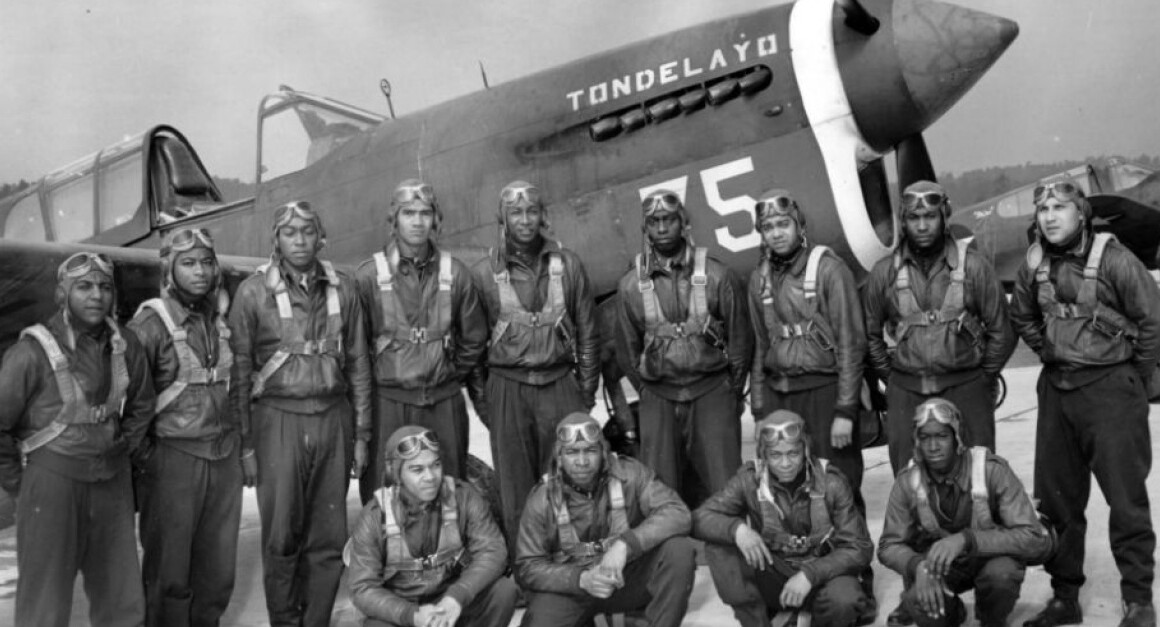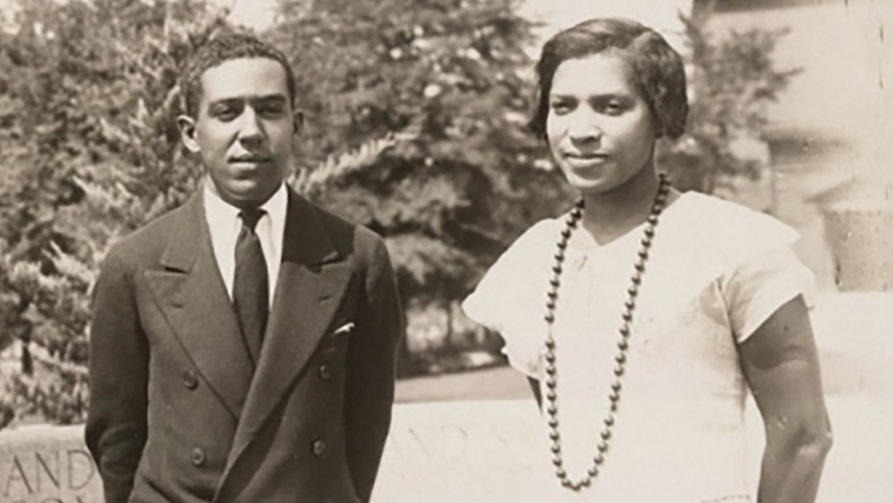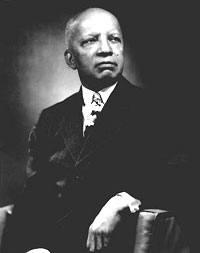
Carter G. Woodson–Pioneer of Black History
In celebration of Black History Month BlackState.com honor’s Carter G. Woodson- The Father Of Black History. BlackState provides the words of one of America’s greatest historians as he discusses the state of education in black America in his 1933 classic The Mis-Education of the Negro.
Carter Godwin Woodson (1875-1950) was born in New Canton, Virginia, in 1875–ten years after the 13th Amendment, abolishing slavery, was written into law. His grandparents and his father, James, a tenant farmer, and mother, Anne, had been slaves. Woodson worked throughout his early school years to help support his parents and siblings. By the time he was able to attend school, he was well past his teens.
Woodson taught himself by reading avidly in his spare time. As a result of his innate intelligence, personal accomplishments, and dedication to learning, he was able to complete high school. In 1903 he graduated with honors from Berea College, a unique college founded by abolitionist in Kentucky.
In 1907 and 1908, respectively, Woodson earned an undergraduate degree and his M.A. from the University of Chicago. Just four years after completing graduate training at the University of Chicago, he was awarded the doctorate from Harvard. This educational background in the country’s leading universities challenged Woodson’s creative imagination. He became increasingly interested in documenting for the permanent historical record the talents and accomplishments of the sons, daughters, grandsons, and granddaughters of slaves.
In 1926, Woodson founded Negro History Week, which was to raise awareness to the contributions of people of African descent made to world history. It was observed in black schools, churches and YMCAs around the country. But over the decades, Woodson’s idea has blossomed into a celebration of African-American culture that became Black History Month in 1976 to coincide with the nation’s bicentennial. Black history month is now being celebrated by diverse communities in the United States and throughout the world.
Woodson believed that historians had whitewashed the contributions blacks have made to the world. His idea was that Negro History Week and, later, Black History Month — would revise what we know about the world we live in advocating similar arguments that proponents of African-centered education say today.
He was instrumental in the founding of the Association for the Study of Negro Life and History in 1915. During his lifetime he was probably the most significant scholar promoting the history and achievements of African Americans. In addition to establishing and publishing the Journal of Negro History, while Woodson was dean of West Virginia Collegiate Institute he served as president of Associated Publishers. The primary purpose of this innovative outlet was to publish and distribute writings by and about African Americans. When Woodson left West Virginia to continue his research, he involved himself more deeply in the work of the Association for the Study of Negro Life and History. It remains today as a monument to his dedication and foresight.
THE WRITINGS OF WOODSON
Carter G. Woodson was one of the country’s prominent historians and a prolific writer. From the moment he received the doctorate from Harvard, he initiated a career in publishing. In 1915 he wrote The Education of the Negro Prior to 1861, in which he concentrated on both the obstacles and the progress characterizing the schooling of the descendants of slaves. Three years later he published A Century of Negro Migration. This was introduced in 1918, as World War I was coming to a close. The examination of patterns of migration was followed by The Negro in Our History, published in 1922. This work has been defined as “the first textbook of its kind.”
Among Woodson’s basic writings are those that describe patterns of migration and family composition. For example, under the auspices of the Association for the Study of Negro Life and History he prepared two important documents–one on slave holding and the other on heads of families: Free Negro Owners of Slaves in the United States in 1830, together with Absentee Ownership of Slaves in the United States in 1830 (1924) and Free Negro Heads of Families in the United States in 1830 together with A Brief Treatment of The Free Negro (1925).
Additional Woodson’s writings, include The African background outlined or Handbook for the study of the Negro (1936), Freedom and slavery in Appalachian America (1973), Negro makers of history (1958), Negro orators and their orations (1925), The rural Negro (1969), The history of the Negro church (2nd ed., 1922), and Historical genealogy of the Woodsons and their connections (1915). See also Doris Y. Wilkinson, “Forgotten Pioneers,” Think, the newsletter of the Kentucky Humanities Council (October 1988), and Encyclopedia of Black America (3rd ed., 1988).
Excerpt of the famed classic The Mis-Education of The Negro by Carter G. Woodson
PREFACE
The author does not support the once popular view that in matters of education Negroes are rightfully subjected to the will of others on the presumption that these poor people are not large taxpayers and must be content with charitable contributions to their uplift. The author takes the position that the consumer pays the tax, and as such every individual of the social order should be given unlimited opportunity to make the most of himself. Such opportunity, too, should not be determined from without by forces set to direct the proscribed element in a way to redound solely to the good of others but should be determined by the make-up of the Negro himself and by what his environment requires of him.
This new program of uplift, the author contends, should not be decided upon by the trial and error method in the application of devices used in dealing with others in a different situation and at another epoch. Only by careful study of the Negro himself and the life which he is forced to lead can we arrive at the proper procedure in this crisis. The mere imparting of information is not education. Above all things, the effort must result in making a man think and do for himself just as the Jews have done in spite of universal persecution.
In thus estimating the results obtained from the so-called education of the Negro the author does not go to the census figures to show the progress of the race. It may be of no importance to the race to be able to boast today of many times as many “educated” members as it had in 1865. If they are of the wrong kind the increase in numbers will be a disadvantage rather than an advantage. The only question which concerns us here is whether these” educated” persons are actually equipped to face the ordeal before them or unconsciously contribute to their own undoing by perpetuating the regime of the oppressor.
Herein, however, lies no argument for the oftheard contention that education for the white man should mean one thing and for the Negro a different thing. The element of race does not enter here. It is merely a matter of exercising common sense in approaching people through their environment in order to deal with conditions as they are rather than as you would like to see them or imagine that they are. There may be a difference in method of attack, but the principle remains the same. I
“Highly educated” Negroes denounce persons who advocate for the Negro a sort of education different in some respects from that now given the white man. Negroes who have been so long inconvenienced and denied opportunities for development are naturally afraid of anything that sounds like discrimination. They are anxious to have everything the white man has even if it is harmful. The possibility of originality in the Negro, therefore, is discounted one hundred per cent to maintain a nominal equality. If the whites decide to take up Mormonism the Negroes must follow their lead. If the whites neglect such a study, then the Negroes must do likewise. The author, however, does not have such an attitude. He considers the educational system as it has developed both in Europe and America an antiquated process which does not hit the mark even in the case of the needs of the white man himself. If the white man wants to hold on to it, let him do so; but the Negro, so far as he is able, should develop and carry out a program of his own.
The so-called modern education, with all its defects, however, does others so much more good than it does the Negro, because it has been worked out in conformity to the needs of those who have enslaved and oppressed weaker peoples. For example, the philosophy and ethics resulting from our educational system have justified slavery, peonage, segregation, and lynching. The oppressor has the right to exploit, to handicap, and to kill the oppressed. Negroes daily educated in the tenets of such a religion of the strong have accepted the status of the weak as divinely ordained, and during the last three generations of their nominal freedom they have done practically nothing to change it. Their pouting and resolutions indulged in by a few of the race have been of little avail. No systematic effort toward change has been possible, for, taught the same economics, history, philosophy, literature and religion which have established the present code of morals, the Negro’s mind has been brought under the control of his oppressor. The problem of holding the Negro down, therefore, is easily solved. When you control a man ‘s thinking you do not have to worry about his actions. You do not have to tell him not to stand here or go yonder. He will find his” proper place” and will stay in it. You do not need to send him to the back door. He will go without being told. In fact, if there is no back door, he will cut one for his special benefit. His education makes it necessary.
The same educational process which inspires and stimulates the oppressor with the thought that he is everything and has accomplished everything worth while, depresses and crushes at the’ same time the spark of genius in the Negro by making him feel that his race does not amount to much and never will measure up to the standards of other peoples. The Negro thus educated is a hopeless liability of the race.
The difficulty is that the “educated Negro” is compelled to live and move among his own people whom he has been taught to despise. As a rule, therefore, the “educated Negro” prefers to buy his food from a white grocer because he has been taught that the Negro is not clean. It does not matter how often a Negro washes his hands, then, he cannot clean them, and it does not matter how often a white man uses his hands he cannot soil them. The educated Negro, moreover, is disinclined to take part in Negro business, because he has been taught in economics that Negroes cannot operate in this part1.cular sphere. The “educated Negro” gets less and less pleasure out of the Negro church, not on account of its primitiveness and increasing corruption, but because of his preference for the seats of “righteousness” controlled by his oppressor. This has been his education, and nothing else can be expected of him.
If the “educated Negro” could go off and be white he might be happy, but only a mulatto now and then can do this. The large majority of this class, then, must go through life denouncing white people because they are trying to run’ away from the blacks and decrying the blacks because they are not white.
CHAPTER I: THE SEAT OF THE TROUBLE
THE “educated Negroes” have the attitude of contempt toward their own people because in their own as well as in their mixed schools Negroes are taught to admire the Hebrew, the Greek, the Latin and the Teuton and to despise the African. Of the hundreds of Negro high schools recently examined by an expert in the United States Bureau of Education only eighteen offer a course taking up the history of the Negro, and in most of the Negro colleges and universities where the Negro is thought of, the race is studied only as a problem or dismissed as of little consequence. For example, an officer of a Negro university, thinking that an additional course on the Negro should be given there, called upon a Negro Doctor of Philosophy of the faculty to offer such work. He promptly informed the officer that he knew nothing about the Negro. He did not go to school to waste his time that way. He went to be educated in a system which dismisses the Negro as a nonentity.
At a Negro summer school two years ago, a white instructor gave a course on the Negro, using for his text a work which teaches that whites are superior to the blacks. When asked by one of the students why he used such a text- book the instructor replied that he wanted them to get that point of view. Even schools for Negroes, then, are places where they must be convinced of their inferiority. The thought of’ the inferiority of the Negro is drilled into him in almost every class he enters and in almost every book he studies. If he happens to leave school after he masters the fundamentals, before he finishes high school -or reaches college, he will naturally escape some of this bias and may recover in time to be of service to his people.
Practically all of the successful Negroes in this country are of the uneducated type or of that of Negroes who have had no formal education at all. The large majority of the Negroes who have put on the finishing touches of our best colleges are all but worthless in the development of their people. If after leaving school they have the opportunity to give out to Negroes what traducers of the race would like to have it learn such persons may thereby earn a living at teaching or preaching what they have been taught. but they never become a constructive force in the development of the race. The so-called school, then, becomes a question- able factor in the life of this despised people.
As another has well said, to handicap a student by teaching him that his black face is a curse and that his struggle to change his condition is hopeless is the worst sort of lynching. It kills one’s aspirations and dooms him to vagabondage and crime. It is strange, then, that the friends of truth and the promoters of freedom have not risen up against the present propaganda in the schools and crushed it. This crusade is much more important than the anti- lynching movement, because there would be no lynching if it did not start in the schoolroom. Why not exploit, enslave, or exterminate a class that everybody is taught to regard as inferior’
To be more explicit we may go to the seat of the trouble. Our most widely known scholars have been trained in universities outside of the South. Northern and Western institutions, however, have had no time to deal with matters which concern the Negro especially. They must direct their attention to the problems of the majority of their constituents, and too often they have stimulated their prejudices by referring to the Negro as unworthy of consideration. Most of what these universities have offered as language, mathematics, and science may have served a good purpose, but much of what they have taught as economics, history, literature, religion and philosophy is propaganda and cant I; that involved a waste of time and misdirected the Negroes thus trained. And even in the certitude of science or mathematics it has been unfortunate that the approach to the Negro has been borrowed from a “foreign” method. For example, the teaching of arithmetic in the fifth grade in a backward county in Mississippi should mean one thing in ! the Negro school and a decidedly different thing in the white school. The Negro children, as a rule, come from the homes of tenants and peons who have to migrate annually from plantation to plantation, looking for light which they have never seen. The children from the homes of white planters and merchants live permanently in the midst of calculations, family budgets, and the like, which enable them sometimes to learn more by contact than the Negro can acquire in school. Instead of teaching such Negro children less arithmetic, they should be taught much more of it than the white children, for the latter attend a graded school consolidated by free transportation when the Negroes go to one- room rented hovels to be taught without equipment and by incompetent teachers educated scarcely beyond the eighth grade.
In schools of theology Negroes are taught the interpretation of the Bible worked out by those who have justified segregation and winked at the economic debasement of the Negro at times almost to the point of starvation. Deriving their sense of right from this teaching, graduates of such schools can have no message to grip the people whom they have been ill trained to serve. Most of such mis-educated ministers, therefore, preach to benches while illiterate Negro preachers do the best they can in supplying the spiritual needs of the masses.
In the schools of business administration Negroes are trained exclusively in the psychology and economics of Wall Street and are, therefore, made to despise the opportunities to run ice wagons, push banana carts, and sell pea- nuts among their own people. Foreigners, who have not studied economics but have studied Negroes, take up this business and grow rich.
In schools of journalism Negroes are being taught how to edit such metropolitan dailies as the Chicago Tribune and the New York Times, which would hardly hire a Negro as a janitor; and when these graduates come to the Negro weeklies for employment they are not prepared to function in such establishments, which, to be successful, must be built upon accurate knowledge of the psychology and philosophy of the Negro.
When a Negro has finished his education in our schools, then, he has been equipped to begin the life of an Americanized or Europeanized white man, but before he steps from the thresh- old of his alma mater he is told by his teachers that he must go back to his own people from whom he has been estranged by a vision of ideals which in his disillusionment he will realize that he cannot attain. He goes forth to play his part in life, but he must be both social and bisocial at the same time. While he is a part of the body politic, he is in addition to this a member of a particular race to which he must restrict himself in all matters social While serving his country he must serve within a special group. While being a good American, he must above all things be a “good Negro”; and to perform this definite function he must learn to stay in a “Negro’s place.”
For the arduous task of serving a race thus handicapped, however, the Negro graduate has had little or no training at all. The people whom he has been ordered to serve have been belittled by his teachers to the extent that he can hardly find delight in undertaking what his education has led him to think is impossible. Considering his race as blank in achievement, then, he sets out to stimulate their imitation of others. The performance is kept up a while; but, like any other effort at meaningless imitation, it results in failure.
Facing this undesirable result, the highly educated Negro often grows sour. He becomes too pessimistic to be a constructive force and usually develops into a chronic fault-finder or a complainant at the bar of public opinion. Often when he sees that the fault lies at the door of the white oppressor whom he is afraid to at- tack, he turns upon the pioneering Negro who is at work doing the best he can to extricate him- self from an uncomfortable predicament.
In this effort to imitate, however, these “educated people” are sincere. They hope to make the Negro conform quickly to the standard of the whites and thus remove the pretext for the barriers between the races. They do not realize, however, that even if the Negroes do successfully imitate the whites, nothing new has thereby been accomplished. You simply have a larger number of persons doing what others have been doing. The unusual gifts of the race have not thereby been developed, and an unwilling world, therefore, continues to wonder what the Negro is good for.
These” educated” people, however, decry any such thing as race consciousness; and in some respects they are right. They do not like to hear such expressions as “Negro’ literature,” , Negro poetry,” “African art,” or “thinking black”; and, roughly speaking, we must con- cede that such things do not exist. These things did not figure in the courses which they pursued in school, and why should they’ “Aren’t we all Americans then, whatever is American is as much the heritage of the Negro as of any other group in this country.”
The “highly educated” contend, moreover, that when the Negro emphasizes these things he invites racial discrimination by recognizing such different ness of the races. The thought that the Negro is one thing and the white man another is the stock-in-trade argument of the Caucasian to justify segregation. Why, then, should the Negro blame the white man for doing what he himself does.
These “highly educated” Negroes, however, fail to see that it is not the Negro who takes this position. The white man forces him to it, and to extricate himself there from the Negro leader must so deal with the situation as to develop in the segregated group the power with which they can elevate themselves. The different ness of races, moreover, is no evidence of superiority or of inferiority. This merely indicates that each race has certain gifts which the others do not possess. It is by the development of these gifts that every race must justify its right to exist.
CHAPTER X THE LOSS OF VISION
HISTORY shows, then, that as a result of these unusual forces in the education of the Negro he easily learns to follow the line of least resistance rather than battle against odds for what real history has shown to be the right course. A mind that remains in the present atmosphere never undergoes sufficient development to experience what is commonly known as thinking. No Negro thus submerged in the ghetto, then, will have a clear conception of the present status of the race or sufficient foresight to plan for the future; and he drifts so far toward compromise that he loses moral courage. The education of the Negro, then, becomes a perfect device for control from without. Those who purposely promote it have every reason to rejoice, and Negroes themselves exultingly champion the cause of the oppressor.
A comparison of the record of the spokesmen of the race today with that of those of the eighteenth century shows a moral surrender. During the prolonged struggle between the French and English in America the Negroes held the balance of power at several strategic points and used it accordingly; today the Negro finds himself inconsequential because he can be parked on one side of the fence. The same balance of power was evident also during the American Revolution when Negro soldiers insisted on serving side by side with others; to- day many Negroes are content as menials in the army. At that time Negroes preached to mixed congregations; today we find Negroes busy separating them. The eighteenth-century Negro resented any such thing as social distinctions; today Negroes are saying that they do not want social equality. Negroes of that epoch said with the ancient poet, “I am a man and deem nothing that relates to man a matter of indifference to me”; today, however, the aver- age Negro says, ” Now, I am a colored man, and you white folks must settle that matter among yourselves.”
At a still later date the American Negro showed more courage than he does today with all of his so-called enlightenment. When the free Negroes were advised a hundred years ago to go to Africa they replied that they would never separate themselves from the slave population of this country as they were brethren by the” ties of consanguinity, of suffering, and of wrong.” Today, however, the Negro in the North turns up his nose at the crude migrant from the South who brings to the North the race problem but along with it more thrift and actual progress than the Northern Negro ever dreamed of.
When, again in 1816, free Negroes like Richard Allen, James Forten, and Robert Purvis, were referred to as a foreign element whose social status might not be secure in this country, instead of permitting the colonizationists to shove them aside as criminals to be deported to a distant shore, they replied in no uncertain terms that this soil in America which gave them birth is their only true home. “Here their fathers fought, bled, and died for this country and here they intended to stay.” Today when such things come up you find Negroes appearing upon the scene to see how much pay they can obtain to assist in the proposed undoing of the race. Further emphasizing this thought of resistance a few years later, Nathaniel Paul, a Baptist preacher of Albany, informed the colonizationists that the free Negroes would not permit their traducers to formulate a program for the race. You may go ahead with your plan to de- port this element in order to make slavery se- cure, he warned; but the free Negroes will never emigrate to Africa. “We shall stay here and fight until the foul monster is crushed. Slavery must go.”
“Did I believe it would always continue,” said he, “and that man to the end of time would be permitted with impunity to usurp the same undue authority over his fellow, I would disavow any allegiance or obligation I was under to my fellow creatures, or any submission that I owed to the laws of my country! I would deny the superintending power of divine Providence in the affairs of this life; I would ridicule the religion of the Savior of the world, and treat as the worst of men the ministers of the ever- lasting gospel; I would consider my Bible as a book of false and delusive fables, and commit it to the flames; nay, I would still go farther; I would at once confess myself an atheist, and deny the existence of a holy God.” And these Negroes of a century ago stood their ground and fought the pro-slavery deportationists to a standstill, for with the exception of a few pioneers the emigrants to Liberia were largely slaves manumitted on the condition that they would settle in Africa. These freedmen, then, could have no ideals but those of the slave- holding section from which they were sent. They established, therefore, a slavocracy in Liberia. If Liberia has failed, then, it is no evidence of the failure of the Negro in government. It is merely evidence of the failure of slavery.
The Negroes attacking Jim-Crowism almost a century ago fearlessly questioned the constitutionality of such a provision. Speaking through Charles Lenox Remond of that day, they said, “There is a distinction between social and civil rights. We all claim the privilege of selecting our society and associations, but, in civil rights, one man has not the prerogative to define rights for another. These [race] distinctions react in all their wickedness-to say nothing of their concocted and systematized odiousness and absurdity-upon those who are illiberal and mean enough to practice them.” In our day, however, we find some “highly educated” Negroes approving such Jim-Crow- ism. For example, not many years ago an out- standing Baptist preacher, dabbling in politics in West Virginia, suggested to the whites that they enact a Jim Crow car law in that State, and we had difficulty in crushing that sentiment. A few years thereafter the author heard one of our bishops say that we should not object to such separation, for we want to be by ourselves. When this distinguished churchman died the traducers of the Negro lauded him to the skies; and thoughtless members of the race, thinking that he deserved it, joined in the loud acclaim. In this way the large majority of “educated” Negroes in the United States have accepted segregation and have become its fearless champions. Their filled but undeveloped minds do not enable them to understand that, although an opiate furnishes temporary relief, it does not remove the cause of the pain. In this case we have yielded on principle to satisfy the mob, but have not yet found an ultimate solution of the problem at hand. In our so-called democracy we are accustomed to give the majority what they want rather than educate them to understand what is best for them. We do not show the Negro how to overcome segregation, but we teach him how to accept it as final and just.
Numerous results from this policy may be cited. The white laboring man refuses to work with Negroes because of the false tradition that the Negro is an inferior, and at the same time the Negro for the same reason becomes content with menial service and drudgery. The politician excludes the Negro from the councils of his party and from the government because he has been taught that such is necessary to maintain the supremacy of his race; the Negro, trained in the same school of thought, accepts this as final and contends for such meager consideration as the bosses may begrudgingly grant him. An irate resident in an exclusive district protests against an invasion by Negroes because he has learned that these poverty- stricken people are carriers of disease and agents of crime; the Negroes, believing that such is the truth, remain content in the ghetto. The irrational parent forces the separation of the races in some schools because his child must occupy a seat next to a pupil of “tainted”
African blood; the educated Negro accepts this as inevitable and welcomes the makeshift for his people. Children of Negroes are excluded from the playgrounds because of the assertion that they, will contaminate those of the whites; the Negroes yielding, settle down to a policy of having their children grow up in neglected fashion in the most undesirable part of the city. The Negro is forced to ride in a Jim Crow car to stamp upon him more easily the badge of his “inferiority”; the “educated Negro” accepts it as settled and abandons the fight against this social proscription.
And thus goes segregation which is the most far-reaching development in the history of the Negro since the enslavement of the race. In fact, it is a sequel of slavery. It has been made possible by our system of mis-educating innocent people who did not know what was happening. It is so subtle that men have participated in promoting it without knowing what they were doing.
There are a few defenders of’ segregation who are doubtless sincere. Although nominally free they have never been sufficiently enlightened to see the matter other than as slaves. One can cite cases of Negroes who opposed emancipation and denounced the abolitionists.
A few who became free re-enslaved themselves. A still larger number made no effort to become free because they did not want to disconnect themselves from their masters, and their kind still object to full freedom. Ever since the Civil War when Negroes were first given a chance to participate in the management of their affairs they have been inconsistent and compromising. They have tried to gain one thing on one day by insisting on equality for all, while at the same time endeavoring to gain another point the next day by segregation. At one moment Negroes fight for the principle of democracy, and at the very next moment they barter it away for some temporary advantage. You cannot have a thing and dispose of it at the same time.
For example, the Negro political leaders of the Reconstruction period clamored for suffrage and the right of holding office, serving in the militia, and sitting on the jury; but few of them wanted white and colored children to attend the same school. When expressing themselves on education most of them took the position of segregationists; and Charles Sumner in his fight for the civil rights of the Negro had to eliminate mixed schools from his program not only because many whites objected but also be- cause the Negroes themselves did not seem to want them. All of these leaders might pot have been looking for jobs in those days; but as nominal freemen, who were still slaves, they did not feel comfortable in the presence of their former masters.
These timorous men were very much like home Negroes who were employed near the author’s home in Virginia by a Northern farmer, who had moved into the State after the Civil War. When breakfast time came the first morning he called them in to eat at the table with his family. These actual slaves, however, immediately lost their a ppeti tea One finally called the employer aside and settled the matter in another way. He said: “Now boss, you ain’t used to de rules ob dis country. We just can’t sit at de table wid wite folks. We been use ter eating a cake er bread out yonder ‘tween de plow handles. Les us go out dar.” The system, therefore, has extended from one thing to another until the Negroes today find themselves hedged in by the color bar almost every way they turn; and, set off by themselves, the Negroes cannot learn from the example of others with whom they might come into contact. In the ghetto, too, they are not permitted to construct and carry out a program of their own. These segregating institutions interfere with the development of self-help among Negroes, for often Negroes fail to raise money to establish institutions which they might control, but they readily contribute large sums for institutions which segregate persons of African blood. Denied participation in the higher things of life, the “educated” Negro himself joins, too, with ill-designing persons to handicap his people by systematized exploitation. Feeling that the case of the Negro is hopeless, the “educated” Negro decides upon the course of personally profiting by whatever he can do in using these people as a means to an end. He grins in their faces while “extracting money” from them, but his heart shows no fond attachment to their despised cause. With a little larger income than they receive he can make himself somewhat comfortable in the ghetto; and he forgets those who have no way of escape.
Some of this” educated” class join with un- principled real estate men in keeping Negroes out of desirable parts of the city and confining them to unsanitary sections. Such persons help the profiteer to collect from Negroes thus cornered a larger rental than that exacted from whites for the same property. In similar fashion a Negro minister sometimes goes into a community where the races are moving along amicably together in their churches and rents a shack or an old empty store to start a separate church for “our people,” not to supply any practical need but to exploit those who have never learned to think. Professional men, too, walking in their footsteps, impose also upon the poor innocent Negroes who do not know when they are being treated properly and when they are not, but high fees may be obtained from them inasmuch as they cannot always go to others for service.
Settling in a community with mixed schools, the educated Negro often advocates their separation that his daughter may secure a position in the system. The Negro politician is accustomed to corner the Negro vote, by opening a separate office from which he may bargain with the chieftains of the machine for the highest price available. When paid off by some position, which is not very lofty, this office- holder accepts such employment with the under- standing that he will be set off by himself as if he were destructive of the rest of mankind.
In the present crisis, however, the “highly educated” Negroes find very little to exploit, and in their untoward condition they have no program of finding a way out. They see numerous instances of Negroes losing their jobs in white establishments. In fact, these things occur daily. Janitors who have been giving satisfaction are abruptly told that they will no longer be needed. Negro waiters in hotels are ~ being informed that their places will go to white f workers. Negro truck drivers are ordered to ~I step down and let the needy of the other race ~ go up. We hear so much of this that we wonder what the outcome will be.
In this readjustment, of course, when there I are fewer opportunities left for those who cannot or do not have the opportunity to operate, machines the Negroes will naturally be turned out of their positions by their employer who; think first of their own race. In the ultimate passing of the depression, however, Negroes will not be much better off when some of the whites now displacing them will rise to higher levels. In the economic order of tomorrow there will be little use for the factotum or scullion. Man will not need such personal attention when he can buy a machine to serve him more efficiently. The menial Negroes, the aggregate of parasites whom the “highly educated” Negro has exploited, will not be needed on tomorrow. What, then, will become of “our highly educated” Negroes who have no initiative!
We have appealed to the talented tenth for a remedy, but they have nothing to offer. Their minds have never functioned in this all- important sphere. The “educated” Negro shows no evidence of vision. He should see a new picture. The Negroes are facing the alternative of rising in the sphere of production to supply their proportion of the manufacturers and merchants or of going down to the graves of paupers. The Negro must now do for him- self or die out as the world undergoes readjustment. If the whites are to continue for some time in doing drudgery to the exclusion of, Negroes, the latter must find another way out. Nothing forces this upon one more dramatically than when he learns that white women in Montgomery, Alabama, are coming to the back door of Negro homes asking for their washing. If the whites have reached this extremity, and they must be taken care of first, what will be left for the Negroes.
At this moment, then, the Negroes must begin to do the very thing which they have been taught that they cannot do. They still have some money, and they have needs to supply. They must begin immediately to pool their earnings and organize industries to participate in supplying social and economic demands. If the Negroes are to remain forever removed from the producing atmosphere, and the present discrimination continues, there will be nothing left for them to do.
There is no reason for lack of confidence because of the recent failure of Negro enterprises, although the “highly educated” Negroes assert the contrary. This lack of confidence is the cause of the failure of these enterprises. If the Negroes had manifested enough confidence in them and had properly supported them, they would have been strong enough to stand the test in the crisis. Negro banks, as a rule, have failed because the people, taught that their own pioneers in business cannot function in this sphere, withdrew their deposits. An individual cannot live after you extract the blood from his veins. The strongest bank in the United States will last only so long as the people will have sufficient confidence in it to keep their money there. In fact, the confidence of the people is worth more than money.
The lack of confidence of the Negro in himself and in his possibilities is what has kept him down. His mis-education has been a perfect success in this respect. Yet it is not necessary for the Negro to have more confidence in his own workers than in others. If the Negro would be as fair to his own as he has been to others, this would be all that is necessary to give him a new lease on life and start the trend upward.
Here we find that the Negro has failed to re- cover from his slavish habit of berating his own and worshipping others as perfect beings. No progress has been made in this respect be- cause the more” education” the Negro gets the worse off he is. He has just had so much longer to learn to decry and despise himself. The race looking to this educated class for a solution of its problems does not find any remedy; and, on the contrary, sees itself further and further away from those things to which it has aspired. By forgetting the schoolroom for the time being and relying upon an awakening of the masses through adult education we can do much to give the Negro a new point of view with respect to economic enterprise and group cooperation. The average Negro has not been sufficiently mis-educated to become hopeless.
Our minds must become sufficiently developed to use segregation to kill segregation, and thus bring to pass that ancient and yet modern prophecy, “The wrath of man shall praise thee.” If the Negro in the ghetto must eternally be fed by the hand that pushes him into the ghetto, he will never become strong enough to get out of the ghetto. This assumption of Negro leadership in the ghetto, then, must not be confined to matters of religion, education, and social uplift; it must deal with such fundamental forces in life as make these things possible. If the Negro area, however, is to continue as a district supported wholly from without, the inept dwellers therein will merit and will receive only the contempt of those who may occasionally catch glimpses of them in their plight.
As Frederick Douglass said in 1852, “It is vain that we talk of being men, if we do not the work of men. We must become valuable to society in other departments of industry than those servile ones from which we are rapidly being excluded. We must show that we can do as well as they. When we can build as well as live in houses; when we can make as well as wear shoes; when we can produce as well as consume wheat, corn and rye-then we shall become valuable to society.
“Society,” continued Douglass, “is a hard hearted affair. With it the helpless may expect no higher dignity than that of paupers. The individual must lay society under obligation to him or society will honor him only as a stranger and sojourner.”


